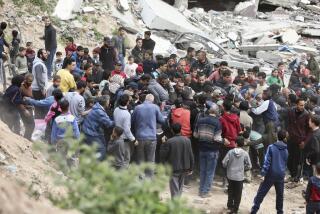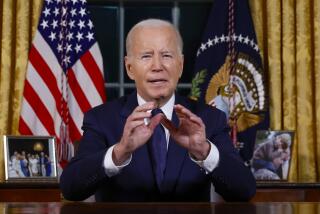BUSH INSISTS HE’LL STAND BY HIS IRAQ GOALS
- Share via
WASHINGTON — President Bush, seeking to shore up sagging preelection support for the Iraq war, acknowledged three years of setbacks Wednesday and expressed dissatisfaction over a frustrating and deadly month. But he insisted that he would stand by his goal of helping foster a government that can “sustain itself, govern itself and defend itself.”
With the U.S. congressional election on Nov. 7 appearing increasingly to be a referendum on the war he started in March 2003, the president sought to clarify his Iraq policy at a time when violence has been escalating, U.S. casualties increasing, and political breakthroughs in Baghdad proving elusive.
“The events of the past month have been a serious concern to me, and a serious concern to the American people,” Bush said at a White House news conference 13 days before the midterm U.S. balloting. “We’ve got patience, but not unlimited patience.”
Bush, who in recent days has altered his disciplined “stay-the-course” message, endorsed a schedule of benchmarks for political progress and greater Iraqi control, while condemning those who called for timetables for troop withdrawals.
Meanwhile, in Baghdad, Iraqi Prime Minister Nouri Maliki said he would not accept any timelines imposed by the Americans. He also criticized a new U.S. military effort to disrupt Shiite Muslim militant groups in the Baghdad slum of Sadr City, a stronghold of one of his allies, anti-American cleric Muqtada Sadr.
Speaking at a news conference before Bush spoke in Washington, Maliki declared that “the Americans have the right to review their policies, but we do not believe in a timetable, and no one will impose one on us.”
Bush is under pressure to begin pulling troops out of Iraq in the face of unrelenting sectarian violence between Sunni Arab and Shiite Muslims and continuing attacks on U.S. forces. Americans, he said, “have no intention of taking sides in a sectarian struggle or standing in the crossfire between rival factions.”
At the same time, he defended U.S. attempts to calm Baghdad, where one-third of the more than 90 U.S. deaths this month took place.
October has been the deadliest month for American troops this year.
Despite his unusually sober assessment, Bush also said that U.S. goals for a stable, democratic and prosperous Iraq were “unchanging,” and he declared, “Absolutely, we’re winning.”
A deadline for withdrawing troops, Bush said, “means defeat.”
Calling for patience, he declared in the White House East Room: “We cannot allow our dissatisfaction to turn into disillusionment about our purpose in this war. We must not look at every success of the enemy as a mistake on our part, cause for an investigation, or a reason to call for our troops to come home.”
For one hour -- one-fourth of it taken up by his opening statement -- Bush spelled out what he sees as the stakes in Iraq and the stakes in the election, in which Democrats are widely believed to have their best chance for gaining a majority since Republicans took control of the House in 1994.
He sought to convince a doubting public that he is pursuing a necessary course, and is ready to adjust tactics to meet new challenges. But he also emphasized that he would not give up his overarching goal after more than three years of war, the deaths of nearly 3,000 U.S. troops and many thousands of Iraqis.
Even as he avoided saying that he would “stay the course,” he presented a plan that did not yield to demands that he set a specific timetable for withdrawal, or even that he set the United States on a specific course to a reduced presence in Iraq.
“I know we’re not going to succeed, however, if we set artificial timetables for withdrawal, or we get out of there, or we say to the enemy: ‘Just keep fighting. We’ll leave soon,’ ” he said.
“I know many Americans are not satisfied with the situation in Iraq,” he said. “I’m not satisfied, either.”
With Democrats hammering Republican incumbents for their support of the war in congressional districts throughout much of the country, Bush sought to throw a cloak of presidential protection over his allies.
“The ultimate accountability,” he said, rests not with the generals or Defense Secretary Donald H. Rumsfeld -- whom Bush again endorsed, calling him “a smart, tough, capable administrator.”
Rather, the president said, accountability “rests right here.”
“If people are unhappy about it, look right to the president,” he said.
Bush’s austere assessment of the war came as polls have found that Americans are growing gloomier about the outlook in Iraq.
A USA Today/Gallup Poll released Wednesday found that Americans are as pessimistic about the war as they were in April 2004, during an insurgent uprising in Fallouja that saw the bodies of civilian U.S. workers dragged through the streets.
Fifty-eight percent said the war was “a mistake,” more than six in 10 Americans said things were going badly in Iraq, and a majority said the situation was “out of control.”
For the first time, as many Americans said the insurgents were winning the war as said the United States and its allies were winning.
Assessing problems and obstacles in Iraq, Bush cited multiple mistakes and setbacks, some of which he has acknowledged before: the failure to find unconventional weapons, the 2003 insurgent bombing of the U.N. headquarters in Baghdad, the inability of some Iraqi units to perform as expected and the continued loss of American lives.
Bush repeated several times that the United States was shifting its tactics in Iraq, noting the dispatch of additional troops to Baghdad to counter sectarian violence.
“My point to the American people is ... that we’re constantly adjusting our tactics to achieve victory,” Bush said.
He said that regardless of the devastation and obstacles, Americans must recognize that their security “depends on ensuring that Iraq is an ally in the war on terror and does not become a terrorist haven, like Afghanistan under the Taliban.”
The extent to which Iraq has come to dominate the public face of the Bush presidency and the election was demonstrated by the amount of time devoted to it at the news conference. All but two of the questions dealt to one degree or another with Iraq, much as the war took up nearly all of his news conference two weeks ago.
On the issue of North Korea, the president said that despite signs of reluctance by China and South Korea to enforce U.N. Security Council sanctions against the government in Pyongyang in response to its announcement of a nuclear test, “the coalition remains firm.”
At the heart of the latest shift in U.S. policy in Iraq is the plan to use “benchmarks” to demonstrate progress toward the president’s broader goal of a stable and democratic Iraq. The plan was announced Tuesday in a news conference by Army Gen. George W. Casey Jr. and the U.S. ambassador to Iraq, Zalmay Khalilzad. No Iraqi officials were present.
Maliki’s objections Wednesday complicated the notion.
Bush, at his news conference, insisted that there was a difference between benchmarks and a timetable for withdrawal.
Senate Minority Leader Harry Reid (D-Nev.) said later that the new turn reflected a policy “in complete disarray.”
“One day the administration calls for a timetable,” and the Iraqi prime minister objects, Reid said in a written statement. “One day, our senior military leaders indicate more troops may be needed, the next day the president discounts that option. One day it’s stay the course, the next day it’s change the course.”
“It is increasingly clear that the president does not know what to do to stop the escalating violence in Iraq and that his so-called ‘National Strategy for Victory in Iraq’ has failed,” Reid said.
*
Times staff writers Paul Richter and Julian E. Barnes contributed to this report.
More to Read
Sign up for Essential California
The most important California stories and recommendations in your inbox every morning.
You may occasionally receive promotional content from the Los Angeles Times.










